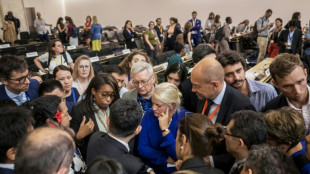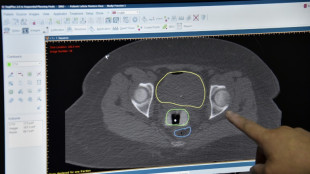
-
 Spain PM vows 'climate pact' on visit to fire-hit region
Spain PM vows 'climate pact' on visit to fire-hit region
-
Serbia's president vows 'strong response' after days of unrest

-
 Brazilian goalkeeper Fabio equals Shilton record for most games played
Brazilian goalkeeper Fabio equals Shilton record for most games played
-
Warholm in confident swagger towards Tokyo worlds

-
 Air Canada to resume flights after govt directive ends strike
Air Canada to resume flights after govt directive ends strike
-
Israelis rally nationwide calling for end to Gaza war, hostage deal
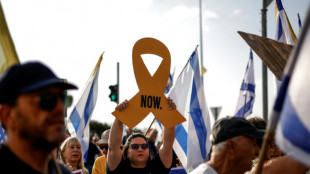
-
 European leaders to join Zelensky for Ukraine talks with Trump
European leaders to join Zelensky for Ukraine talks with Trump
-
Downgraded Hurricane Erin lashes Caribbean with rain

-
 Protests held across Israel calling for end to Gaza war, hostage deal
Protests held across Israel calling for end to Gaza war, hostage deal
-
Hopes for survivors wane as landslides, flooding bury Pakistan villages

-
 After deadly protests, Kenya's Ruto seeks football distraction
After deadly protests, Kenya's Ruto seeks football distraction
-
Bolivian right eyes return in elections marked by economic crisis

-
 Drought, dams and diplomacy: Afghanistan's water crisis goes regional
Drought, dams and diplomacy: Afghanistan's water crisis goes regional
-
'Pickypockets!' vigilante pairs with social media on London streets
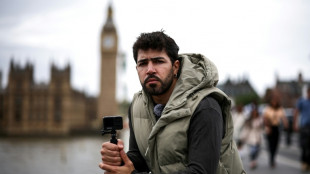
-
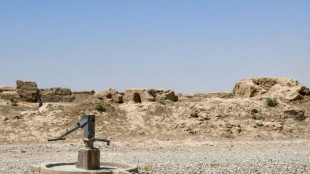 From drought to floods, water extremes drive displacement in Afghanistan
From drought to floods, water extremes drive displacement in Afghanistan
-
Air Canada flights grounded as government intervenes in strike

-
 Women bear brunt of Afghanistan's water scarcity
Women bear brunt of Afghanistan's water scarcity
-
Reserve Messi scores in Miami win while Son gets first MLS win

-
 Japan's Iwai grabs lead at LPGA Portland Classic
Japan's Iwai grabs lead at LPGA Portland Classic
-
Trump gives Putin 'peace letter' from wife Melania

-
 Alcaraz to face defending champ Sinner in Cincinnati ATP final
Alcaraz to face defending champ Sinner in Cincinnati ATP final
-
Former pro-democracy Hong Kong lawmaker granted asylum in Australia
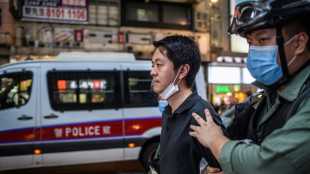
-
 All Blacks beat Argentina 41-24 to reclaim top world rank
All Blacks beat Argentina 41-24 to reclaim top world rank
-
Monster birdie gives heckled MacIntyre four-stroke BMW lead

-
 Coffee-lover Atmane felt the buzz from Cincinnati breakthrough
Coffee-lover Atmane felt the buzz from Cincinnati breakthrough
-
Coffe-lover Atmane felt the buzz from Cincinnati breakthrough

-
 Monster birdie gives MacIntyre four-stroke BMW lead
Monster birdie gives MacIntyre four-stroke BMW lead
-
Hurricane Erin intensifies offshore, lashes Caribbean with rain

-
 Kane lauds Diaz's 'perfect start' at Bayern
Kane lauds Diaz's 'perfect start' at Bayern
-
Clashes erupt in several Serbian cities in fifth night of unrest

-
 US suspends visas for Gazans after far-right influencer posts
US suspends visas for Gazans after far-right influencer posts
-
Defending champ Sinner subdues Atmane to reach Cincinnati ATP final

-
 Nigeria arrests leaders of terror group accused of 2022 jailbreak
Nigeria arrests leaders of terror group accused of 2022 jailbreak
-
Kane and Diaz strike as Bayern beat Stuttgart in German Super Cup

-
 Australia coach Schmidt hails 'great bunch of young men'
Australia coach Schmidt hails 'great bunch of young men'
-
Brentford splash club-record fee on Ouattara

-
 Barcelona open Liga title defence strolling past nine-man Mallorca
Barcelona open Liga title defence strolling past nine-man Mallorca
-
Pogba watches as Monaco start Ligue 1 season with a win

-
 Canada moves to halt strike as hundreds of flights grounded
Canada moves to halt strike as hundreds of flights grounded
-
Forest seal swoop for Ipswich's Hutchinson

-
 Haaland fires Man City to opening win at Wolves
Haaland fires Man City to opening win at Wolves
-
Brazil's Bolsonaro leaves house arrest for medical exams

-
 Mikautadze gets Lyon off to winning start in Ligue 1 at Lens
Mikautadze gets Lyon off to winning start in Ligue 1 at Lens
-
Fires keep burning in western Spain as army is deployed

-
 Captain Wilson scores twice as Australia stun South Africa
Captain Wilson scores twice as Australia stun South Africa
-
Thompson eclipses Lyles and Hodgkinson makes stellar comeback

-
 Spurs get Frank off to flier, Sunderland win on Premier League return
Spurs get Frank off to flier, Sunderland win on Premier League return
-
Europeans try to stay on the board after Ukraine summit

-
 Richarlison stars as Spurs boss Frank seals first win
Richarlison stars as Spurs boss Frank seals first win
-
Hurricane Erin intensifies to 'catastrophic' category 5 storm in Caribbean
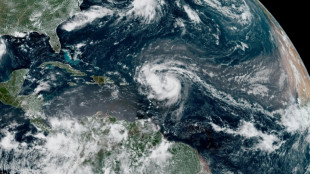

No longer a death sentence: Four decades of living with HIV
Forty years after the discovery of HIV, AFP looks at how far we have come in fighting a deadly virus that was once shrouded in fear and shame but is now treated as a manageable chronic condition.
- 1981: First alert -
In June 1981, US epidemiologists report five cases of a rare form of pneumonia in gay men in California.
It is the first alert about Acquired Immune Deficiency Syndrome (AIDS), still unknown and unnamed.
Doctors then identify "opportunistic infections" among intravenous drug users and in haemophiliacs and Haitian residents in the United States.
The term AIDS appears for the first time in 1982. The disease is wrongly presented as a "homosexual disorder".
- 1983: Identifying HIV -
In January 1983, researchers in France, Francoise Barre-Sinoussi and Jean-Claude Chermann, working under Luc Montagnier, identify the virus that "might be" responsible for AIDS.
Their discovery is published on May 20 in the journal Science.
The following year, US specialist Robert Gallo is said to have found the "probable" cause of AIDS, the retrovirus HTLV-III.
The two viruses turn out to be the same, and in May 1986 it becomes officially known as the Human Immunodeficiency Virus, or HIV.
- 1987: Anti-retroviral treatment -
In March 1987, the first anti-retroviral treatment known as AZT is authorised in the US. It is expensive and has severe side effects.
The United States and France agree that Gallo and Montagnier should get joint credit for discovering HIV. But the 2008 Nobel prize goes to Barre-Sinoussi and Montagnier.
- Early 1990s: Fallen stars -
In July 1985, US actor Rock Hudson announces he has AIDS. His death three months later is the first high-profile AIDS death.
A host of other stars succumb to the disease, including legendary pianist Liberace (February 1987), British singer and Queen frontman Freddie Mercury (November 1991), and the Russian dancer and choreographer Rudolf Nureyev (January 1993).
In 1994, AIDS becomes the leading cause of death among Americans aged between 25 and 44.
- 1995-96: New approach -
Two new classes of drugs signal the start of combinations of different anti-retroviral therapies.
Called tri-therapies, they provide the first effective treatment for HIV.
1996 is the first year in which the number of AIDS deaths declines in the United States. While US numbers decline, they rocket in Africa, where AIDS is the biggest killer by 1999.
- 2001: Generic medicine -
In 2000, UNAIDS and five major drug companies sign a deal to distribute affordable treatments in poorer countries.
A year later, the World Trade Organization changes intellectual property rules to allow developing countries to make generic versions of patent-protected HIV treatments.
In 2004, the country with the world's highest HIV caseload, South Africa, ends years of AIDS denialism and makes anti-retroviral treatments available through the public health system.
- 2010: First cure -
Timothy Ray Brown, an American man who had been living with HIV for over a decade, is cured of the virus after undergoing cancer treatment.
Brown underwent two bone marrow transplants containing a mutation of a gene that blocks HIV from attacking host cells.
- 2012: Preventive pill -
In July 2012, the first-ever daily pill to help prevent HIV infection is approved by US regulators. Truvada is a pre-exposure prophylaxis, or PrEP, taken by high-risk people who are HIV-negative in order to prevent them from being infected.
- 2017: Treatment spreads -
For the first time, more than half of all people living with HIV are receiving anti-retroviral treatment.
The proportion rises to three-quarters: 28.7 million people are being treated out of 38.4 million who are infected, according to UNAIDS in 2021.
- 2020-2021: Covid setback -
The Covid-19 pandemic disrupts access to health systems, testing and treatment, slowing progress in the fight against AIDS, which in 40 years has killed 40.1 million people.
In 2021, 650,000 AIDS deaths and 1.5 million new infections are recorded.
UNAIDS hopes to end AIDS as a public health threat by 2030.
R.Adler--BTB


